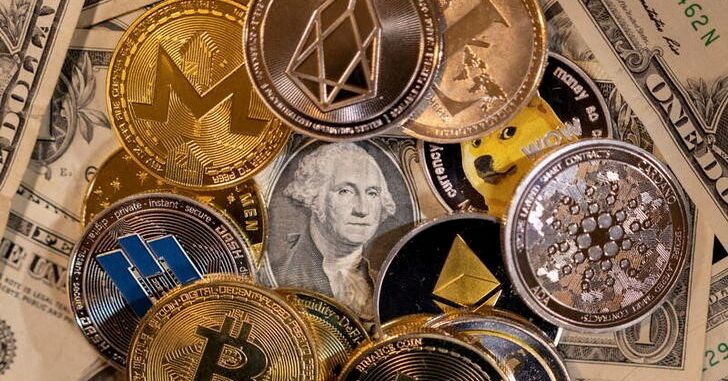Representations of virtual cryptocurrencies are placed on U.S. dollar banknotes in this illustration taken November 28, 2021. REUTERS/Dado Ruvic/
WASHINGTON, June 8 (Reuters Breakingviews) – Regulations often solve one problem while creating another. Such is the case with new cryptocurrency guidelines being suggested by the U.S. Securities and Exchange Commission. The watchdog wants firms that safeguard digital assets to mark that risk on their balance sheets, with banks ending up having to hold large amounts of equity against it. That might help transparency, which the market needs. But it would become too costly for legitimate lenders like Goldman Sachs (GS.N) to get into the market, and incentivize more shadowy businesses.
Without warning, Gary Gensler’s agency issued an accounting bulletin two months ago that recommends public companies tally the risk of safeguarding the $1.2 trillion crypto market for clients by recording it on their balance sheet as a liability at the currency’s fair market value. Most firms would need to comply starting with second-quarter financial statements.
Banks would take the biggest hit. This new measure could trigger compliance with the Basel Committee read more , which includes the Federal Reserve. Last year that group put out recommendations that a bank would effectively have to match the amount of equity on its balance sheet with the amount of a digital asset that it had, assuming an 8% capital ratio. So for every $1 of crypto, equity would need to increase by as much though the largest U.S. banks have even higher standards.
The SEC guidance would effectively make it too costly for banks to hold crypto for clients, and it has left other companies scrambling. Crypto exchange Coinbase Global (COIN.O) had about $246 billion in customer digital assets as of March 31, which may need to be added to its $21 billion balance sheet. Online brokerage Robinhood Markets' (HOOD.O) position would double its $20 billion balance sheet according to first quarter figures. The measure may even apply to firms that farm out custody of digital assets to third parties, like Goldman.
Some guardrails and more disclosures would be helpful. In the event that a cryptocurrency’s value falls, it may be difficult for a custodian holding the asset, say, State Street (STT.N), to sell large amounts of it. And depending on the amount of the decline, banks like Goldman read more could be left holding the bag, and given crypto volatility, that could create some risks.
Still there is a balance, and making it completely prohibitive for banks is a bigger problem. The cryptocurrency market is already laden with people using the asset for dodgy transactions. If the SEC is meant to make investments safer, measures that are so stringent that heavily-regulated U.S. banks are precluded from participating does the opposite.
Follow @GinaChon on Twitter
(The author is a Reuters Breakingviews columnist. The opinions expressed are her own.)
CONTEXT NEWS
Two financial industry groups on May 27 asked the U.S. Securities and Exchange Commission to delay the effective date of an agency accounting bulletin on the risk of cryptocurrency assets. The groups are the Securities Industry and Financial Markets Association and the American Bankers Association.
The bulletin, known as SAB 121 was issued on March 31 and requires most SEC registrants that safeguard crypto assets for clients or users to record that risk on their balance sheets, calculated at the fair value of the related digital assets. Most affected public companies would need to comply by the time they issue financial statements for the second quarter of 2022.
Our Standards: The Thomson Reuters Trust Principles.
GlaxoSmithKline’s personal health spinoff is beginning life with a target on its back. Haleon, maker of Advil painkillers and Sensodyne toothpaste, will next month list in London, and could be worth 42 billion pounds. But with two large shareholders keen to sell out, lots of debt and a challenging consumer backdrop, it may not stay single for long.
Reuters, the news and media division of Thomson Reuters, is the world’s largest multimedia news provider, reaching billions of people worldwide every day. Reuters provides business, financial, national and international news to professionals via desktop terminals, the world's media organizations, industry events and directly to consumers.
Build the strongest argument relying on authoritative content, attorney-editor expertise, and industry defining technology.
The most comprehensive solution to manage all your complex and ever-expanding tax and compliance needs.
The industry leader for online information for tax, accounting and finance professionals.
Access unmatched financial data, news and content in a highly-customised workflow experience on desktop, web and mobile.
Browse an unrivalled portfolio of real-time and historical market data and insights from worldwide sources and experts.
Screen for heightened risk individual and entities globally to help uncover hidden risks in business relationships and human networks.
All quotes delayed a minimum of 15 minutes. See here for a complete list of exchanges and delays.
© 2022 Reuters. All rights reserved
Author
Administraroot

